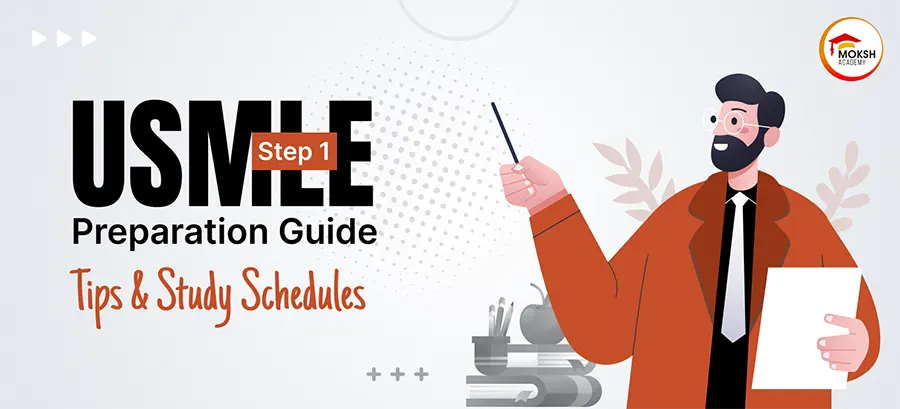
How is the USMLE exam structured?
USMLE Step 1 is a computer-based exam conducted over a single day, lasting eight hours. It comprises seven one-hour blocks, each containing 40 questions. Test-takers are given one hour of break time, which can either be used all at once or divided into shorter breaks of 5-10 minutes between question blocks.
What subjects are covered in USMLE Step 1?
The subjects covered include:
- Biochemistry
- Anatomy
- Physiology
- Microbiology and Immunology
- Pathology
- Pharmacology
- Biostatistics and Epidemiology
- Medical Ethics
- Behavioral Science
- Genetics and Aging
When should I start preparing for USMLE Step 1?
USMLE Step 1 tests the basic science subjects covered in the first two years of medical school for most International Medical Graduates (IMGs). Ideally, you should take the test immediately after completing your second year when the concepts are still fresh in your mind.
If you couldn't take the exam in medical school or decided to pursue USMLE post-graduation, don't worry! Students who start late or have lost touch with basic sciences may need additional resources like textbooks or video lectures to refresh their understanding. It's important to note that it's never too late to start, and this situation will only be a disadvantage if you let it discourage you.
How long does it take to prepare for USMLE Step 1?
Preparation time varies significantly based on:
- Time since graduation
- Command over basic sciences
- Time dedicated to study daily
- Individual reading styles
For IMGs:
- If you've just completed the second year of medical school, 4-6 weeks of dedicated preparation is typically sufficient.
- If you're starting later, you may require 4-6 months of preparation.
- Less time could lead to insufficient readiness, while a significantly longer preparation period might not enhance performance.
What are the resources available for the USMLE Step 1 exam?
USMLE Step 1 is a critical milestone, as your score determines your residency prospects and can strengthen your fellowship application. Below are the core resources:
Core Resources
First Aid for the USMLE Step 1:
- Often referred to as the “Holy Book” for Step 1 preparation.
- Comprehensive and ideal as a guiding resource.
- May require supplementation with additional resources for conceptual understanding.
- Always check the Errata section on the First Aid website for updates and corrections: Errata.
UWorld for the USMLE Step 1:
- The most essential resource, focusing on application-based questions.
Goals :
- Solve and review every question.
- Memorize learning objectives and master test-taking strategies.
- Develop speed: aim for one question per 60-65 seconds.
NBME Assessments:
- Ideal for assessment and identifying strengths/weaknesses.
- As of now, six Comprehensive Basic Science Self-Assessments (CBSSA) are available.
- Cost: $60 per test.
- Provides predictive feedback for the actual test.
UWorld Self-Assessments (UWSAs):
- Two assessments are currently available.
Goals:
- Estimate readiness.
- Identify weaknesses.
- Review explanations for correct/incorrect answers.
Additional Resources
Subject-Wise Recommendations
| Subject |
Recommended Resources |
| Biochemistry/Genetics |
Kaplan video lectures + Kaplan lecture notes |
| Microbiology/Immunology |
Kaplan notes + Dr. Najeeb lectures for Immunology |
| Anatomy |
High Yield Gross Anatomy + High Yield Neuroanatomy |
| Physiology |
BRS (Board Review Series) Physiology |
| Pathology |
Pathoma book + Pathoma video lectures by Dr. Sattar |
| Pharmacology |
Kaplan video lectures |
| Behavioral Sciences |
BRS Behavioral Sciences + Kaplan video lectures |
| Biostatistics/Ethics |
Kaplan notes and video lectures + Fischer's 100 Cases in Medical Ethics |
Other Popular Resources
- Question Banks: Kaplan QBank, USMLE Rx, AMBOSS, Pastest
- Review Books: First Aid Organ Systems, Step-Up to USMLE Step 1, Pathoma
- Videos: SketchyMedical, Dr. Najeeb, Boards and Beyond, Picmonic
- Flashcards: Anki, First Aid Flash Facts
How many resources should be used?
Quality > Quantity:
- Focus on mastering a few resources rather than juggling multiple ones.
- Core: First Aid for content and UWorld for application.
How to make a study schedule?
Success depends on consistency and planning. Consider these tips:
Divide Preparation into Two Phases:
- Preparatory Phase (75% of your time): Learn, master concepts, and complete one pass of First Aid and UWorld.
- Revision Phase (25% of your time): Focus on revising notes, taking NBMEs/UWSAs, and enhancing test-taking skills.
Daily Study Schedule:
- Dedicating 5-8 hours daily.
- Take breaks every 45-60 minutes to avoid burnout.
Utilize Tools:
- Use planners like the free tool at USMLE Sarthi for structured preparation.
Teach to Retain:
- Test understanding by teaching others or explaining aloud.
Revise Effectively:
- Use Spaced Revision Technique to improve long-term retention.
Conclusion
MOKSH Academy is committed to guiding medical students and graduates toward success in their international licensing exams. With experienced faculty, tailored resources, and a focus on innovative learning, it provides the tools needed to excel. Choose MOKSH as your partner in achieving your medical career aspirations.



